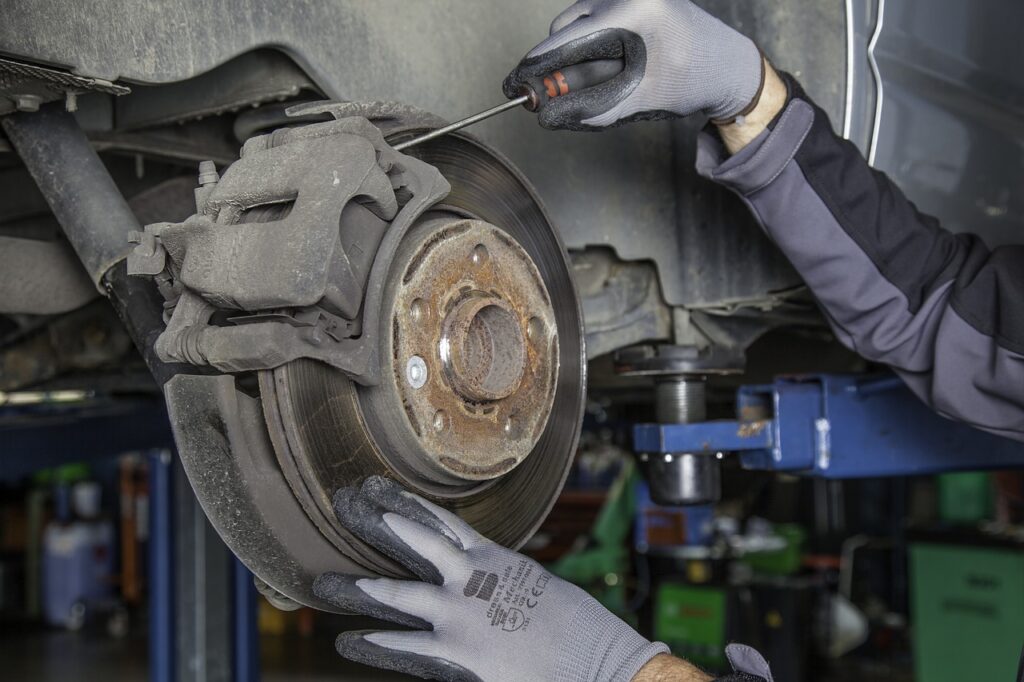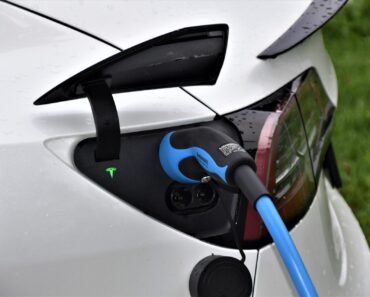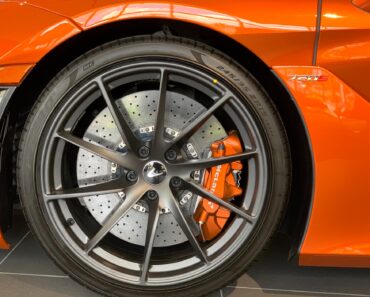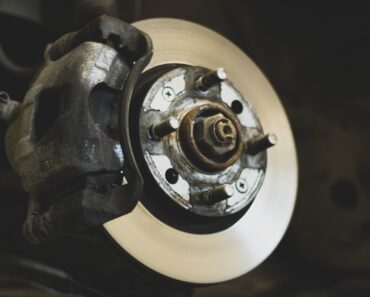There are many reasons why your car could shake or shudder when you hit the brakes. For safety reasons, it’s important to address the problem as soon as you can. Below, you will find a list of the most common problems that can make this happen.

Brake Rotors Problem
As the brake pedal is pressed, the brake calipers push the brake pads against the brake rotors, creating the necessary friction to stop your car. The brake rotors’ surface must be smooth to ensure even contact with the brake pads. Some problems that come with the wear and tear of the brake rotors can be the source of the problem.
– Warped brake rotors: when the brake rotors’ walls get too thin because of wear, they are prone to get bent and warped by the heat resulting from braking. When the surface of the rotors becomes uneven, the brake pads don’t seat properly over the brake discs, and this causes vibration.
– Uneven brake rotors: this results in the same effect as warped brake rotors. Sometimes, brake rotors wear down unevenly, preventing the brake pads from having the same amount of contact with the rotors as they rotate.
– Scratched-up brake rotors: extremely worn brake pads or bad quality brake pads can scratch your brake rotors. When this happens, you will notice several grooves on your brake rotors. Apart from producing vibrations, these grooves usually generate screeching noises when you brake.
Worn Brake Pads
Extremely worn brake pads can also make your car shake when you brake. The vibration can be caused by the brake pads’ wear indicator, which is a metal tab designed to squeal, alerting the driver that something is wrong with the brakes and that it’s time to replace them. The metal-to-metal friction can cause vibration while you press the brakes. It’s always best to replace the brake pads before reaching the wear indicator in order to avoid damaging the brake rotors. Brake pads can also get damaged or warped, which can cause vibrations similar to the ones caused by defective braking rotors.
Stuck Brake Calipers
A stuck brake caliper will apply uneven pressure to the rotors. When the pressure applied to the rotors is not constant, it causes undesired vibrations.
Dry Guide Pins
Brake caliper guide pins are a part of the brake caliper where the brake piston assembly sits. As the brakes are being pressed, they guide the brake pad towards the brake rotor keeping them at a proper angle. Lack of lubrication of this part will prevent them from pushing the brake pad against the rotor at a proper angle or will make the caliper stick, causing vibrations that result in the car shaking when you brake.
Air Inside the Brake Lines
If air entered your brake lines, you will feel your brake pedal spongy and wobbly. Besides, in some cases, it can cause the brake pump to deliver uneven pressure to the brake calipers, which will make the brake pads push your brake rotors unevenly. This could make your car shake when you apply the brakes.
Out-of-round Drums
Vehicles fitted with rear drum brakes can shake if the brake drums are worn out unevenly. As happens with the brake rotors and the brake pads, vibrations can occur if the linins (equivalent to the brake pads) are pressed against uneven brake drums.
Unbalanced Tires
Apart from becoming noisy and shaky at certain speeds, some cases of unbalanced tires can cause your car to shake when you brake.
Worn out tire/s
While a bad tire or set of tires usually creates a constant shake as the car is being driven, which is more often noticed at high speeds, they can become “outrounded”.
Sometimes, depending on the deformation of the tire, it can make your car vibrate when you accelerate or de-accelerate. In some cases, you will feel the tremble more when you are braking your car.
Alignment Issues
When a vehicle is severely out of alignment, brake shudder can happen. Misaligned wheels can not only produce shaking and vibrations when you brake but can also be a symptom of bad steering and suspension components and, at the same time, if the misalignment is severe, it can damage your vehicle.
Bent Rims
Bent rims produce a similar effect as worn of misaligned tires. A slight bent on a rim will unbalance the whole wheel. That’s why a bent rim also feels like an unbalanced wheel.
Bad Steering and Suspension Components
If you have checked all the items above and they are ok, it’s time to check your steering and suspension components.
– Defective ball joints and tie rods: these components usually shake when you turn the steering wheel, but they can also do it while you are braking.
– Damaged axle shaft: a damaged axle shaft or CV joint can produce vibrations that increase as the vehicle speed increases. However, in some cases, it can produce the same effect as an unbalanced wheel and cause your car to shake when you hit the brakes.
– Defective wheel bearings: it’s a known fact that defective wheel bearings buzz while the wheels are spinning. However, when a wheel bearing is starting to get damaged, it makes a buzz when you brake. That buzz will travel to the rest of the steering components and will feel like a shaking.
Loose Lug Nuts
This is a very long shot, but it’s possible. Loose lug nuts make the wheel wobble, and it gets more noticeable as the vehicle slows down.
Summary
As you can see, the most common problems that cause your car to shake when you brake are related to the brakes themselves. However, as described above, there are some exceptions that you should bear in mind. Some problems are more dangerous than others, but all need to be taken care of as soon as possible to avoid putting other people’s and your own safety at risk. A good thing is that none of these problems is too expensive to fix. That’s another reason not to leave this matter unattended.






